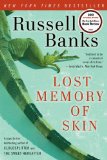Summary | Excerpt | Reviews | Beyond the Book | Read-Alikes | Genres & Themes | Author Bio

A Novel
by Russell BanksThis article relates to Lost Memory of Skin
Lost Memory of Skin revolves around a colony of convicted sex offenders residing beneath the Archie B. Claybourne Causeway, which connects the city of Calusa, Florida with the bordering Great Panzacola Swamp. Banks's vivid descriptions bring these fictional locations to life, and though they are imaginary, both the city and the colony bear a striking resemblance to real-life Miami and the community of sex offenders living under the Julia Tuttle Causeway.

In 2005, Miami-Dade County passed one of the most stringent sex offender laws in the country; it stated that registered sex offenders could not live within 2,500 feet of a school, bus stop, park, or any other place that children might gather. According to the American Civil Liberties Union of Florida (ACLU), "it has become virtually impossible for these individuals to find affordable housing in Miami-Dade County that meets the 2,500 foot requirement." As a result, a sex offender community formed under the Julia Tuttle Causeway, a bridge that connects Miami Beach with mainland Florida.
At the time of a 2009 report by NPR, registered sex offenders were required to report to the shanty town between the hours of 6pm and 7am to check in with patrolling parole officers, and many were even issued licenses listing "Julia Tuttle Causeway: Under Bridge" as their residence. Some officials claim that this unusual housing situation increased public safety because sex offenders were removed from regular society and could be physically located at any given time. However, many (such as the ACLU and the offenders themselves) disagreed, calling this housing solution a violation of human rights.
The Miami-Dade Homeless Trust, a group formed by the county to help end homelessness, states that in April 2010, the Julia Tuttle Causeway dwellers were moved into better, more affordable housing alternatives. However, according to an interview with Russell Banks in the New York Times, "the causeway homeless were evicted in 2010 after they became too visible and embarrassing... and there is now a chain-link fence and a 'No Trespassing' sign barring access to the area."
Russell Banks leaves no clues as to why he didn't use the actual place names in the novel, but as one of his characters notes, maybe a story about a convicted sex offender is "not a story likely to be welcomed by the... Chamber of Commerce or the local tourist board."
Watch the video below to see images of the shanty town and to hear offenders talk about their experiences living under the Julia Tuttle Causeway.
Image of Julia Tuttle Causeway, credit Marc Averette
Filed under Society and Politics
![]() This "beyond the book article" relates to Lost Memory of Skin. It originally ran in November 2011 and has been updated for the
July 2012 paperback edition.
Go to magazine.
This "beyond the book article" relates to Lost Memory of Skin. It originally ran in November 2011 and has been updated for the
July 2012 paperback edition.
Go to magazine.
Life is the garment we continually alter, but which never seems to fit.
Click Here to find out who said this, as well as discovering other famous literary quotes!
Your guide toexceptional books
BookBrowse seeks out and recommends the best in contemporary fiction and nonfiction—books that not only engage and entertain but also deepen our understanding of ourselves and the world around us.